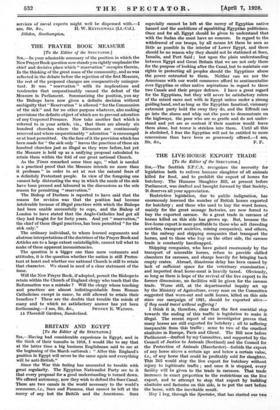BRITAIN AND EGYPT
[To the Editor of the SPECTATOR.] Sni.,—Having had considerable experience in Egypt, and in the thick of their tumults in 1918, I would like to say that at the latter time a big business Englishman said to me at the beginning of the March outbreak : " After this England's position in Egypt will never be the same again and everything will be anti-British."
Since the War this feeling has amounted to trouble with great regularity. The Egyptian Nationalist Party see to it that every proposal for a good understanding is turned down. We offered autonomy, now they wish to defend the Suez Canal. There are two canals in the world necessary to the world's commerce, i.e., Suez and Panama, that cannot be left at the mercy of any but the BritZt and the Americans. Suez
especially cannot be left at the mercy of Egyptian native hazard and the ambitions of squabbling Egyptian politicians. Once and for all, Egypt should be given to understand that with the Sudan she must have no concern. In regard to the withdrawal of our troops, by all means let them be seen as little as possible in the interior of Lower Egypt, and there should be no reason- why they should not be stationed at Suez, Tsmalin, and Port Said ; but upon the plain understanding between Egypt and Great Britain that we are not only there for the purpose of looking after the Canal, but to maintain our rights in protecting all peoples should the Egyptians abuse the power entrusted to them. Neither can we nor the Americans with our world commerce afford to sentimentalize over Egyptian or other native aspirations in • regard to these two Canals and their proper defence. I have a great regard for the Egyptians, but they will never be satisfactory rulers of the mixed races met with in Egypt unless under a strong guiding hand, and as long as the Egyptian fanatical, visionary extremist party hold the sway they do, and the Effendi can go into the slums and whip out the poor- to demonstrate on the highways, the poor who are so gentle and do not under- stand and, yet are so content if their masters would leave them alone, but -terror is stricken into them. Until all this is abolished, I fear the Egyptian will not- be entitled to more concessions than have been so generously offered.—I am,






































 Previous page
Previous page